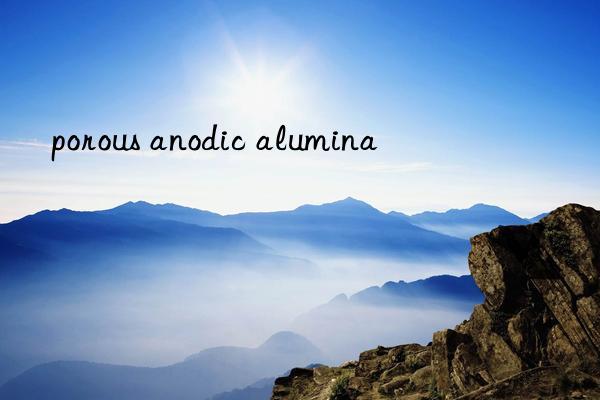
| Post Date: | Jan 06,2022 |
| Expiry Date: | Jan 06,2023 |
| Detailed Description: |
ultrathin Free-standing Porous Anodic Alumina Introduction Self-organized porous anodic alumina (PAA) with hexagonal cell structure and parallel nanopore array fabricated by anodizing aluminum has been investigated and applied in many commercial products for over 100 years. Some researchers use anodic aluminum oxide (AAO) or anodic alumina membrane (AAM) as the name of this product. Our company calls this product PAA to emphasize that it is a porous nanoscale structure. The research on PAAs accelerates in recent 10 years since more and more PAA’s new applications in various fields were discovered, such as templates for nanostructures, photonics, magnetics, high selective filters, energy storage and biosensors. Some references are listed for customers: F. Keller, M. S. Hunter, D. L. Robinson, J. Electrochem. Soc. 100 (1953) 411. G. E. Thompson, G. C. Wood, Nature 290 (1981) 230. C. R. Martin, Science 266 (1994) 1961. A. P. Li, F. Müller, A. Birner, K. Nielsch, U. Gösele, J. Appl. Phys. 84 (1998) 6023. J. E. Houser, K. R. Hebert, Nature Mater. 8 (2009) 415. J. Papadopoulos, C. Li, J. M. Xu, Nature 492 (1999) 253. G. Q. Ding, M. J. Zheng, W. L. Xu, W. Z. Shen, Nanotechnology 16 (2005) 1285. W. Lee, R. Ji, U. Gösele, K. Nielsch, Nat. Mater. 5 (2006) 741. S. Z. Chu, K. Wada, S. Inoue, M. Isogai, A. Yasumori, Adv. Mater. 17 (2005) 2115. Y. Li, Z. Y. Ling, S. S. Chen, J. C. Wang, Nanotechnology 19 (2008) 225604. Our ultrathin free-standing PAA products The ultrathin free-standing PAAs are firstly reported by Ding et al. in 2005 (G. Q. Ding, et al., Fabrication of Controllable Free-standing Ultrathin Porous Alumina Membranes, Nanotechnology 16 (2005) 1285). This kind of PAA can be transferred onto arbitrary substrates, and has been employed for high speed filtration of nanoscale materials, for nanodot even quantum dot array fabrication and for patterning the surface. (a) typical free-standing PAA with an area ~4 cm2 and nanopores ~80 nm on 2 inch silicon wafer, (b) The optical image of the PAAs with the thickness 50nm on 2 inch silicon wafer. It is too thin that it cannot be observed by naked eyes from certain angles Our company have developed ultrathin free-standing PAAs with controlled thickness and pore size.The color of the ultrathin PAA on silicon is sentive to the silicon oxide layer thickness and the PAA thickness. Its microstructure is characterized by FESEM, We can transfer the free-standing PAA onto various substrates, including silicon, silicon oxide, glass, GaN, SiC, copper, nickle, platium, polymers and ceramics. The PAA nanopore size is controllable through adjusting the anodizing process and the post-treatment procedure. Figure 3 and 4 shows the typical 2D and 3D AFM images of PAA with ~45 nm nanopores. One application sample: Nanodot/quantum dot array fabrication Our advantages: Controllabe nanopore diameter Adjustable pore depth Highly ordered Transfer onto arbitrary substrates Very short lead time Professional technical support from with our collaborators 1.China Patent: ZL201010166169.6 2.China Patent: ZL200510025946.4. 3.China Patent: ZL200410067329.6. 4.China Patent Application: CN201010139318.x 5.China Patent Application: CN200910183590.5 6.China Patent Application: CN200510027581.9 7.Thermal Driving Fast Fabrication of Porous Anodic Alumina, J. Electrochem. Soc. 158 (2011) C410-C415. 8.Ultrasound-Assisted Anodization of Aluminum in Oxalic Acid, Appl. Surf. Lett. 258 (2011) 586-589. 9.Fabrication of Porous Anodic Alumina with Ultrasmall Nanopores, Nanoscale Res. Lett. 5 (2010) 1257-1263. 10.Microscale Steps and Micro-Nano Combined Structures by Anodizing Aluminum, Appl. Surf. Sci. 256 (2010) 6279-6283. 11.AFM、SEM and TEM Studies on Porous Anodic Alumina, Nanoscale Res. Lett. 5 (2010) 725-734. 12.Tip-like Anodic Alumina, Nanotechnology 18 (2007) 215304. 13.Indium Oxide “rods in dots” Nanostructures, Appl. Phys. Lett. 89 (2006) 063113. 14.Synthesis of Ordered Large-scale ZnO Nanopore Arrays, Appl. Phys. Lett. 88 (2006) 103106. 15.Integration of Single-crystalline Nanocolumnars into Highly-ordered Nanopore arrays, Nanotechnology 17 (2006) 2590. 16.Fabrication of Controllable Free-standing Ultrathin Porous Alumina Membranes, Nanotechnology 16 (2005) 1285. Ultrathin free-standing PAA specifications: Nanopore diameter (nm) Nanopore depth (nm) Interpore distance (nm) Barrier layer (BL) and aluminum base (AB) Circular piece 3-10 50-400 20 Without BL and AB >1×1cm2 10-20 50-400 25 Without BL and AB >1×1cm2 20-30 100-400 50 Without BL and AB >1×1cm2 30-50 100-400 70 Without BL and AB >1×1cm2 40-90 100-400 100 Without BL and AB >1×1cm2 * Remark: all these free-standing PAAs should be transferred onto substrates. The customer can provide specific substrates, and also can ask us to privide if we have. Other PAA specifications: Nanopore diameter (nm) Nanopore depth (nm) Interpore distance (nm) Barrier layer (BL) and aluminum base (AB) Circular 3-10 50nm-10µm 20 With BL and AB ~4cm2 10-20 50nm-10µm 25 With BL and AB ~4cm2 20-30 600nm-10µm 50 With BL and AB ~4cm2 30-50 100nm-30µm 70 With BL and AB ~4cm2 40-90 200nm-60µm 100 Without BL and AB when >50 µm ~4cm2 50-110 1µm-60µm 130 Without BL and AB when >50 µm ~4cm2 100-250 1µm-60µm 300 Without BL and AB when >50 µm ~4cm2 200-500 250nm-10µm 600-800 Without BL and AB when >50 µm ~4cm2 500-800 500nm-10µm 800-1000 With BL and AB ~4cm2 * Remark: all these free-standing PAAs should be transferred onto substrates. The customer can provide specific substrates, and also can ask us to privide if we have. |


